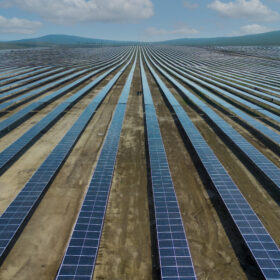Making Greece’s islands energy self sufficient
Greece is pursuing an ambitious island energy transition program. pv magazine visited the island of Tilos for a firsthand account of how one community has blazed a trail in the energy transition.
The Hydrogen Stream: IGI Poseidon, Corinth Pipeworks test H2 transport pipes
IGI Poseidon has partnered with Corinth Pipeworks to test carbon-steel pipes for hydrogen transport under high pressure, while Axpo has begun building a green hydrogen plant in Switzerland to fuel vessels and other applications from 2026.
Researchers complete Europe’s first PV soiling loss assessment
A European research group has adapted a soiling model for use across the continent, analyzing scenarios with complete and partial rain cleaning to calculate energy losses and increases in the levelized cost of energy (LCOE), marking Europe’s first techno-economic PV soiling assessment.
Bringing clean African electrons to Europe
A raft of ambitious interconnection projects has been announced to bring African electrons to European shores. While there are financial and supply chain challenges to overcome, the renewables potential on offer across North Africa is exciting investors.
Masdar acquires 70% stake in Terna Energy
Abu Dhabi-based Masdar has taken a majority stake in Greek renewable energy company Terna Energy, with plans to launch an all-cash mandatory tender offer to acquire the outstanding shares.
Greece, EU set up €1.6 billion fund for island decarbonization
The Greek government, the European Commission, and the European Investment Bank (EIB) have launched the Islands Decarbonisation Fund. They have initially secured €1.6 billion ($1.7 billion) to finance decarbonization projects across the Greek islands.
Greece launches 200 MW battery storage auction
Interested parties can submit bids by December 23. Awarded projects will be announced in February 2025 and need to be connected to the grid by April 2026.
The Hydrogen Stream: EU to move forward with H2 projects
The European Union will continue advancing hydrogen projects, focusing on infrastructure design and supporting production with European equipment, according to Ursula von der Leyen, president of the European Commission.
Greek researchers develop privacy-preserving PV forecasting technique
Researchers from Greece have developed a PV forecasting technique for prosumer schemes using federated learning, a machine learning method that sends local model updates to a central server for correction. Their simulations show surprising results compared to centralized forecasting.
Rooftop PV installations could raise daytime temperatures in urban environments by up to 1.5 C
New research from India shows that rooftop PV system may have “unintended” consequences on temperartures in urban environments. Rooftop arrays, for example, may potentially lower nighttime temperatures by up to 0.6 C.









